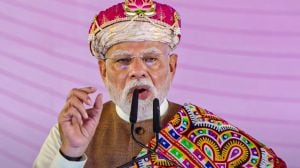A long partnership of shared values
There are many constants in the relationship between Britain and India: our centuries of shared history, our commitment to democracy and to ...

There are many constants in the relationship between Britain and India: our centuries of shared history, our commitment to democracy and to the values of a pluralist society. I am reminded of those constants, and of how valuable they are, every time I come here. But today a regular visitor like me is also struck by how much our relationship is changing, and changing fast. Take business. Britain has long been a leading investor in India — we are currently the third most important. But over the last five years, India has become a significant investor in Britain, and is now the eighth largest. Our business links today are as much in cutting-edge sectors such as biotechnology, IT and pharmaceuticals as they are in more traditional industries.
Look at development. Britain’s commitment to India’s poorest regions has never been stronger: at 200 million every year it is our largest development programme anywhere, and it is set to grow further. But at the same time, Britain and India increasingly find themselves working together as donors, for example in Africa, with the shared goal of tackling poverty and disease around the world. We both want to break down the barriers to international trade and investment in a way which benefits the poorest and most vulnerable.
Or take foreign and security policy. We are stepping up our common fight against the terrorists who have tragically claimed many victims in both our countries. We share an understanding of the need to build lasting security by promoting justice and democratic values, and by building strong and effective international institutions. Change in India is playing a key role in the evolution of our relationship. No one can fail to notice a real feelgood factor in the Indian economy. Economic reforms have allowed Indian business to prosper by breaking down barriers to trade, investment and competition.
But there are wider reasons too for India’s success. Indian society is founded on a solid bedrock of democratic and pluralist institutions and a tradition of tolerance and debate. That helps business because it provides a stable framework in which to operate, while at the same time allowing innovation and creativity to thrive. And it is important for other reasons too. India’s living demonstration of the fact that people of many different faiths and origins can live together in peace and tolerance is a powerful weapon in the fight against terrorism and extremism.
We in Britain have learnt a great deal over the centuries from India’s success in maintaining that vibrant diversity, which has helped us foster the multicultural society of which we ourselves are so proud today. India’s success benefits not just Indians, but all of us. Combine India’s firmly-entrenched democratic and pluralist values with its confidence and growing prosperity, and with its position as the world’s largest democracy (and set to become the largest country of all in the next decades), and you have a 21st century power with huge potential to be a force for good in the world. I warmly welcome that, because an engaged, confident and prospering India is good for us all.
The recent breakthrough in the relationship between India and Pakistan is so welcome not just because it enhances both sides’ security, but because of the hope it gives everyone in South Asia of building a more prosperous and interdependent future. It is good news too that India and China are also finding ways to resolve their differences.
In my own constituency of Blackburn, I see for myself the close interest with which people follow events in the subcontinent, especially but not exclusively those who trace their origins here. The more than 1 million people of Indian origin constitute the largest single ethnic minority in Britain today, and the most prosperous. They play a vital role as a living bridge between our two countries, for example in many of the cutting-edge business links that are boosting investment in both directions.
That is one sign of the fact that our relationship has never been so good, and is prospering. We have long had a partnership of shared values. Today we increasingly have shared goals too, and a common will to achieve them by active engagement in the world. But as our two Prime Ministers have made clear, Britain and India could do even more together than we already do — bilaterally on education, business or culture, and internationally on tackling issues which confront us all, such as the fight against terrorism, trade, global warming, poverty or sustainable development. That gives me plenty to discuss during my visit to India this week, and I am greatly looking forward to it.
The British Foreign Minister began a four-day official visit to India on February 5
Photos


- 01
- 02
- 03
- 04
- 05





























